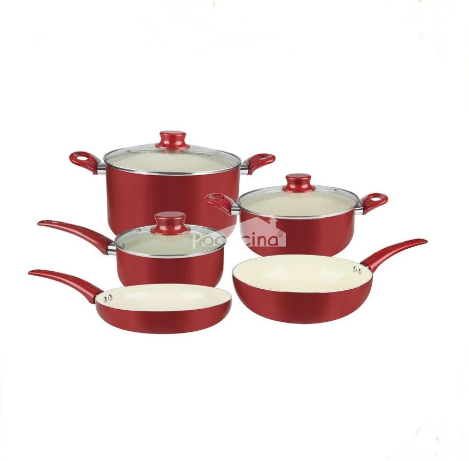Email us at Hailey@topkitchen.cn or Call us today at +86-158 1491 0345
To learn how we can help you with your kitchenware and cookware needs.
The most typical metal used in cookware is aluminum. Yet many people ponder whether it's a wise decision and, more importantly, whether it's safe to use in the kitchen.
Because of its excellent thermal conductivity, aluminum cookware is one of the most popular choices for kitchen appliances. It is a malleable, ductile, and light metal. It quickly oxidizes when in contact with oxygen and forms a thin layer known as alumina that shields it against corrosion.
We discuss why cookware contains aluminum, types of aluminum, and safety concerns in this article.
Aluminum cookware has two purposes. It heats rapidly and evenly due to its high thermal conductivity. Second, it's cheap and abundant the most prevalent metal on Earth. Copper warms faster than aluminum. Copper is rarer and more expensive, therefore only high-end cookware uses it.

The distinctions between stamped, cast, and forged aluminum should be clear to buyers. Aluminum's quality and heating efficiency are influenced by its manufacturing process.
1. Stamped aluminum: is typically found in low-cost cookware. It is the thinnest kind of aluminum cookware and is stamped by a machine from an aluminum sheet. Because it is thin (low mass), stamped aluminum heats up quickly, but because it is also brittle (high mass), it is prone to warping.
2. Cast Aluminum: Molten metal is poured into a cast, or mold, to create cast aluminum. Cast aluminum is often thicker than stamped aluminum, so even while it heats up a little bit more slowly (because of its greater mass), it heats up more evenly, retains heat better, and is less likely to bend.
Due to the low cost of aluminum, many cast aluminum pans are either priced comparable to stamped metal or only somewhat more expensive. Price is not always a reliable indicator, and sometimes it might be difficult to determine if a pan is cast or stamped.
3. Forged Aluminum: Although forged aluminum is produced using a mechanical method, forged parts are formed from substantially thicker materials and result in far more robust goods than stamping. As a result, forged aluminum pans are at least as thick as cast aluminum pans.
Durability varies based on the type of aluminum cookware being discussed.
Nonstick coatings are easily degraded by high temperatures, dishwashers, metal utensils, and abrasive scrub pads, making nonstick-coated aluminum pans the least durable of any cookware.
In actuality, cookware with a nonstick coating will be the least durable in your kitchen. Many individuals accept this and replace their nonstick cookware every two years to have easy-to-clean cookware.
Uncoated, 100 percent aluminum is also not particularly durable. It is susceptible to corrosion and can seep into acidic meals. However, these pans lack a delicate nonstick coating, so you can use them regardless of how scratched or old they are, however, you should generally avoid cooking acidic items in them.
Aluminum is used in a variety of cookware because metal is inexpensive, plentiful, and has great heating qualities. We believe that the greatest aluminum cookware is clad in stainless steel with an aluminum core since it heats well, is durable, and is a good brand that will last for decades or more.
To obtain your set of aluminum cookware and for additional details, get in touch with us.